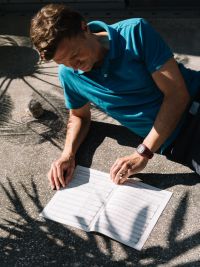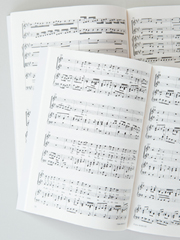A Fascinating and Incredibly Vivid Musical Language
The motet “Unser Leben ist ein Schatten” [We must vanish like a shadow] aroused the enthuasiasm for “Early Music” in Dr. Tobias Rimek.
Already in his school days, while he sang in the Windbach Boys Choir, Dr. Tobias Rimek met the motet Unser Leben ist ein Schatten [We must vanish like a shadow]. The motet is attributed to Johann Bach, the oldest certified representative of the Bach family. the mood of this motet already cast a spell over the young Tobias rimek and his enthusiasm for “Early Music”.
My relationship with the motet Unser Leben ist ein Schatten dates back to my school days, to my time with the Windsbach Boys Choir. When I heard and sang the work for the first time, its mood and atmosphere immediately enchanted me. It was an initial spark that ignited my occupation with and enthusiasm for “Early Music” which has endured to this day.
The motet is part of the collection “Alt-Bachisches Archiv” from Johann Sebastian Bach’s music library which, after Bach’s death, was passed on to his second-oldest son Carl Philipp Emanuel. The bundle finally found its way into the possession of the “Sing-Akademie zu Berlin” from where it was lost in the turmoil of the Second World War. After its spectacular rediscovery in Kiev in 1999, the manuscript was returned to Berlin in 2001. In the source, the motet is attributed to Johann Bach (1604–1673). Its authenticity is, however, disputed. Researchers have also mentioned Johann Michael Bach (1648–1694) as the possible author.
Whoever he was, the composer created a work of fascinating and incredibly vivid musical language. Special acoustic effects are achieved by means of the scoring for 9 parts consisting of two choirs, the first choir of 6 parts and the second – “chorus latens” or remote choir of three parts. In the opening, the composer already displays his mastery of musical text exegesis. The words “Unser Leben” [Our life], sung in the solemn low register is effectively contrasted with “ist ein Schatten” [is a shadow], with the sopranos ascending picturesquely in rapid melismas on the word “Schatten”. Another highlight is the chorale “Ach, wie flüchtig, ach, wie nichtig ist der Menschen Leben” [Ah, how fleeting, ah, how trivial is the life of men] with its both textual and musical intensity and atmospheric density. The last phrase “müssen alle davon” [must all vanish] is repeated several times and progressively accelerates, while at the end, all other voices hush manifestly and the two sopranos sing “davon” one last time, before they, too, fall silent in a general pause.
For me there is hardly another musical work that conveys the ‘spirit’ of the Baroque – especially the era of the Thirty Years War, which was characterized by a sense of both transience and hope – as aesthetically and impressively as Unser Leben ist ein Schatten.
Dr. Tobias Rimek has been an editor at Carus-Verlag since 2012. He has worked extensively at the project Bach vocal. His recently published dissertation was dedicated to the polyphonic repertoire of the Benedictine Abbey St. Ulrich und Afra in Augsburg.






Leave a Reply
Want to join the discussion?Feel free to contribute!